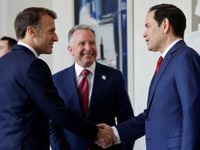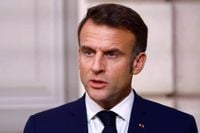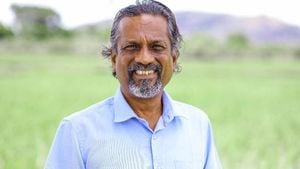In a significant move towards resolving the ongoing conflict in Ukraine, French President Emmanuel Macron has announced that the next round of diplomatic talks will take place in London at the end of April 2025. This announcement follows a series of high-level discussions held at the Élysée Palace, where delegations from the United States, Ukraine, the United Kingdom, and Germany gathered to explore pathways to peace.
Macron expressed gratitude to the American delegation, which included Senator Marco Rubio, Ambassador Barbara A. Leaf, and Lieutenant General (Ret.) Keith Kellogg, as well as representatives from Ukraine, namely Andriy Yermak, Andrii Sybiha, and Defence Minister Rustem Umerov. He also acknowledged the contributions of UK Foreign Secretary David Lammy and German official Jens Plötner during these productive discussions.
"A day of diplomatic mobilization. We are all clearly united in our desire for peace," Macron stated on social media platform X, highlighting the collective commitment to ending the war. He emphasized the importance of President Donald Trump’s proposal to swiftly conclude the conflict, showcasing a strong European resolve to collaborate closely with the United States.
In a follow-up to these discussions, Macron revealed that he had spoken with Ukrainian President Volodymyr Zelenskyy both before and after the meetings to ensure coordination. "Today, we engaged in a positive and constructive discussion on how to achieve both a ceasefire and a comprehensive, lasting peace," Macron added, indicating that the talks are moving in a hopeful direction.
The talks held in Paris on April 17, 2025, marked a pivotal moment as leaders from the US, Europe, and Ukraine convened to discuss a renewed push for peace, which has been increasingly necessary as the war enters its third year. Macron described the gathering as a "very important occasion for convergence," underscoring the need for unity among allies.
During the high-level meeting, discussions centered on building a coordinated diplomatic effort to end the war, which has seen escalating violence, including recent Russian strikes that have resulted in civilian casualties. Ukrainian authorities reported that drone strikes and shelling killed at least 12 people on the same day as the Paris talks, further emphasizing the urgency of reaching a resolution.
Macron’s efforts to engage European powers in the peace process have been welcomed by Zelenskyy, who has previously expressed concerns over the direction of US diplomacy. Zelenskyy's chief of staff, Andriy Yermak, publicly thanked Macron for his diplomatic efforts, stating, "We exchanged views on the next steps toward achieving a just and lasting peace, including the implementation of a full ceasefire, the involvement of a multinational military contingent, and the development of an effective security architecture for Ukraine."
However, not all responses to the Paris summit were positive. The Kremlin’s spokesperson Dmitry Peskov dismissed the talks, claiming they were merely another attempt to prolong the conflict. Meanwhile, Zelenskyy has criticized US envoy Witkoff for allegedly echoing Russian narratives regarding occupied Ukrainian territories, stating, "I believe that Mr. Witkoff has taken on the strategy of the Russian side. I think it is very dangerous, because he is consciously or unconsciously, I don’t know, spreading Russian narratives."
Despite these tensions, the US remains committed to the peace process. Shortly after the Paris meeting, Rubio spoke with Russian Foreign Minister Sergey Lavrov, reaffirming Washington’s dedication to securing a lasting peace. The US State Department indicated that Rubio conveyed a message to Lavrov that President Trump and the United States want the war to end, relaying the outlines of a durable peace framework discussed in Paris.
Lavrov responded by reiterating Russia’s openness to dialogue, with both sides agreeing to maintain swift lines of communication ahead of the upcoming talks in London. This exchange reflects a cautious optimism on both sides, although significant hurdles remain.
As the diplomatic efforts continue, the situation on the ground remains dire. Reports of ongoing violence, including a recent Russian attack that resulted in the deaths of at least 35 people in the northeastern city of Sumy, serve as a stark reminder of the conflict's human cost and the urgent need for a ceasefire.
French Foreign Minister Jean-Noël Barrot highlighted the significance of the recent talks, stating, "For the first time, American, Ukrainian, and European leaders sat around the same table. Europe must be part of the solution." This sentiment resonates with many European leaders who are eager to play a more prominent role in the negotiations, especially as concerns grow over the US's unilateral approach to diplomacy.
As the world watches closely, the upcoming London talks will be critical in determining the future trajectory of peace efforts in Ukraine. With the stakes higher than ever, the hope is that these discussions will lead to tangible steps towards a ceasefire and a lasting resolution to the conflict.
In summary, the renewed push for peace in Ukraine, marked by the recent Paris talks and the forthcoming London summit, represents a potential turning point in the ongoing conflict. The involvement of key leaders from the US, Europe, and Ukraine demonstrates a collective commitment to finding a solution, though significant challenges remain. As violence continues to plague the region, the urgency for a diplomatic resolution has never been clearer.





